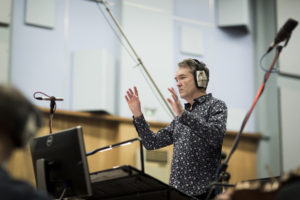
Considering Carter Burwell’s association with sardonic humorists like the Coen Brothers and Spike Jones, he might make an unusual collaborator for a film about a beloved children’s character. But Goodbye Christopher Robin isn’t stereotypical Disney material – it’s really about the life of Pooh’s author, A.A. Milne (Domhnall Gleeson), a struggling writer harboring a bad case of PTSD in addition to the common symptoms of repressed Britishness.
“Milne was clearly unable to express his feelings in any direct way,” relayed Burwell. “That’s his reality. Partly because of the time he lived in and partly because of his World War I experiences. But as a creative person, he managed these experiences by writing.” With the fortuitous birth of his son Christopher Robin (Will Tislston) and a move to the bucolic countryside, Milne is able – at first with great tentativeness – to sidestep the land mines of his delicate psyche. “There are long sections where it might seem that he’s living in the sun dappled countryside, but there are many ways the story is really a tragedy,” Burwell stated. “Maybe that’s what the producers thought I’d be good at… combining the sunlight and the dark side.”
The approach that director Simon Curtis takes is nonlinear, but very unlike the time-fractured stylings of Being John Malkovich (one of Burwell’s mid-career masterpieces). Almost devoid of percussion, the Goodbye score is both fanciful and poignant; emphasizing strings, woodwind and piano with delicate harps. Though Goodbye’s score might (in a cursory manner) recall the pastoral phrasings of Dvořák, Burwell seeds the melodies with unexpected chords which frame the family’s atypical dynamic.
When asked about how music defines character and viewer expectations, Burwell noted, “Generally, I try not to underline what we have seen on the screen, but here the music does have to lead Milne a little bit, take him in the direction, so that he’s finally open to what his Christopher Robin can teach him.”
Only when his wife Daphne (Margot Robbie) leaves Milne in care of Christopher Robin to go galavanting in the city is Milne truly able to bond with his son in a meaningful way. Through these walks in the woods is born the idea for what will become some of the most popular children’s books ever written. While the film balances between tenderness and angst, Burwell confirmed his mutual decision with director Simon Curtis “to not to introduce Winnie’s theme until that character appears on the page. It’s a major theme that only appears halfway in. It’s a big moment for the characters. As a matter of fact, I didn’t score a lot of the first scene in Sussex, the hundred acre wood. Milne and his son were uncomfortable together. By withholding information from the audience, it shows that silence can be a useful tool.”
Burwell acknowledged that “on some level, Goodbye Christopher Robin is a kids movie,” and with that genre comes certain expectations. “One of the biggest challenges was the Mom. Daphne’s a handful,” he laughed. “American audiences just had a hard time with an unlikeable mom. After some screenings in the U.S., I got notes from the producers asking, ‘is there any way we could warm her up?’ We gave a her a tender moment when Christopher comes home at the end of the War. Sometimes we’re called upon to…. fix certain issues. There wasn’t much I could do.”
As you might expect from a creative force with nearly one hundred scores to his credit (no less than three of them debuting in 2017: Christopher Robin, Wonderstuck and Three Billboards in Ebbing, Missouri), Burwell “used to carry a notebook and pen around while shopping or dining in case an idea struck. It’s not usually a melodic idea, but rather an instrumentation concept, something like that.”
Though the score is usually one of the last elements to complete, Burwell is always keen to read the screenplay right away, “but I don’t ever start writing until I can see a rough cut, to get impressions of the pace and the palette,” he related. “I prefer to see the rough cut without any temp music. I’d rather generate my own ideas without being exposed to some other concrete example. That moment of free associating is so important… It’s that blue sky moment.”





